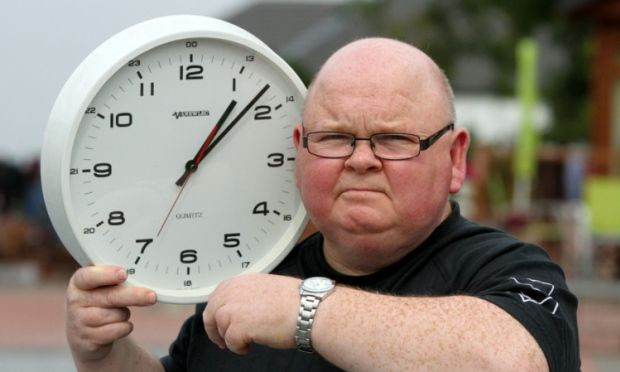Jim Dunbar Diagnosed With Chronic Lateness; Condition Affects Same Region Of The Brain As ADHD

Jim Dunbar recently made plans to see a 7:00 p.m. movie with a friend. The fact that Dunbar arrived 20 minutes late is otherwise unimportant, until you consider that he gave himself an 11-hour head start that day. Dunbar has chronic lateness.
Late To His Own Diagnosis
The condition plaguing the Scotland native has deeper psychiatric roots than simple poor time management skills. Scientists believe the brain functions controlling for timekeeping also keep attention-deficit hyperactivity disorder (ADHD) sufferers from focusing on specific tasks for extended periods of time. Dunbar has missed dates with women, snuck into funerals after they've started, and arrived late to school consistently since he was five years old.
“I get down about it and it’s disturbing for other folk when you arrive late,” Dunbar said, pointing out that on the day he was scheduled to see the 7:00 p.m. movie, he woke up at 8:15 a.m. in preparation to arrive on time. “My family don’t believe it and think I’m making excuses.”
The silver lining for the 57-year-old is that at least his condition has a formal classification, he said. He spent his entire life thinking it was a flaw in his personality and character, but his recent diagnosis has convinced him — and relieved him — otherwise. Of course, on the day he was scheduled to come in for a diagnostic appointment, he showed up 20 minutes late.
“It’s depressing sometimes,” he said. “I can’t overstate how much it helped to say it was a condition.”
Depression, in fact, is suspected of underlying those with chronic lateness — much in the way that ADHD sufferers experience depressive symptoms as a result of their disorder. One 1997 study from San Francisco State University found 17 percent of people were chronically late. Those who exhibited the traits also tended to share certain behaviors with people suffering ADHD. These included procrastination, less self-control, and greater thrill-seeking tendencies. The chronically late tended to gamble more, overeat, shop impulsively, and drink alcohol more frequently.
"People who are chronically late are often wrestling with anxiety, distraction, ambivalence or other internal psychological states," psychologist Dr. Pauline Wallin told Yahoo! Shine, inadvertently highlighting Dunbar’s very obstacles.
“I arranged to pick my friend up at midday to go on holiday and was four hours late. He was furious because we had booked a ferry and everything,” Dunbar said. “It has affected my entire life.”
Overcoming The Condition
And while the condition has deeper roots than time management difficulties, experts seem to agree the same tips can benefit a chronic sufferer as much as the occasional latecomer. The key, they say, is proactivity; assumption will be a person’s downfall.
Here are some tips for people with chronic lateness to overcome their perpetual tardiness:
1) Relearn how to tell time — While seemingly patronizing, many of the problems afflicting chronic lateness sufferers come from their inability to judge how long things really take, often underestimating by up to 30 percent, according to SFSU study author Diana DeLonzor.
2) Never plan to be on time — Jim Dunbar gave himself 11 hours to prepare for the movie, but still planned to be there at 7:00 p.m. People who arrive on time often plan to show up early, as they anticipate delays.
And, most importantly…
3) Have a strategy — People who are constantly late make their incorrect judgments because they don’t intentionally monitor their cumulative behaviors. Simple time checks for daily activities such as doing laundry, making dinner, and showering can arm a person with enough information to build a reliable schedule.
However, despite the seeming ease with which many people craft their daily plans, DeLonzor advises people not to bring down the hammer of ridicule too quickly. Telling a person to be on time works about as well as telling a dieter to eat less.
"If it were that easy,” she quipped, “we wouldn't have Weight Watchers.”



























